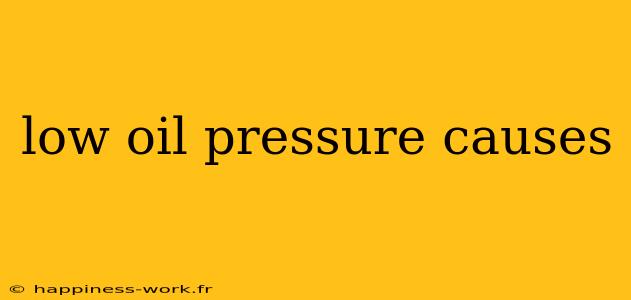Low oil pressure can be a concerning issue for any vehicle owner. It signifies that your engine isn’t receiving adequate lubrication, which can lead to severe engine damage if left unresolved. In this article, we will explore the common causes of low oil pressure, delve into preventative measures, and answer frequently asked questions while providing additional insights to enhance your understanding of this crucial automotive issue.
Common Causes of Low Oil Pressure
-
Insufficient Oil Levels
Q: What happens if my oil levels are too low?
A: When oil levels drop below the required amount, the oil pump struggles to circulate oil throughout the engine, leading to lower pressure. Always regularly check your oil levels and top up as necessary.
Analysis: Regular maintenance and periodic checks can help mitigate this issue. It’s advisable to inspect the oil dipstick monthly, especially before long road trips. -
Oil Leaks
Q: How can oil leaks contribute to low oil pressure?
A: Oil leaks can occur from gaskets, seals, or oil pans. Loss of oil due to leaks reduces the total amount available for circulation, which in turn lowers the oil pressure.
Practical Example: Conducting a visual inspection under your vehicle and around the engine for oil spots can help identify potential leaks. -
Worn Engine Bearings
Q: What role do engine bearings play in oil pressure?
A: Worn bearings create excessive clearance, allowing oil to escape rather than build pressure.
Additional Insight: If you suspect bearing wear, it’s essential to have your engine inspected by a professional, as this can lead to extensive and costly repairs if not addressed timely. -
Faulty Oil Pump
Q: How can a malfunctioning oil pump affect my vehicle?
A: The oil pump is responsible for circulating oil throughout the engine. If it fails or becomes weak, oil pressure drops significantly.
Solution: If diagnosed with an oil pump issue, replace it promptly to restore proper oil pressure and prevent further engine damage. -
Clogged Oil Filter
Q: Can a clogged oil filter cause low oil pressure?
A: Yes, a clogged filter restricts the flow of oil, leading to lower pressure readings.
Practical Example: Regularly changing your oil filter during oil changes can prevent this issue. Follow your manufacturer’s recommendations for both oil and filter changes. -
Oil Viscosity
Q: How does oil viscosity impact oil pressure?
A: Using oil that is too thin for your engine can cause low pressure, especially in hot weather. Ensure you use the right oil viscosity as recommended by your vehicle's manufacturer.
SEO Tip: Look for oil ratings such as 5W-30 or 10W-40 in your owner’s manual and select accordingly.
Preventative Measures to Maintain Oil Pressure
- Regular Oil Changes: Following the recommended oil change intervals can help maintain optimal oil viscosity and cleanliness, contributing to better oil pressure.
- Routine Inspections: Regular vehicle inspections can identify issues such as leaks or worn components before they lead to low oil pressure.
- Using Quality Products: Opt for high-quality oils and filters that meet your vehicle’s specifications, as they can enhance performance and protection.
Conclusion
Low oil pressure can pose serious risks to your engine’s health. Understanding the causes and implementing preventive measures can save you from costly repairs down the line. Regular maintenance, awareness of oil levels, and using the right products are pivotal in ensuring your vehicle remains in good condition. If you find yourself consistently facing low oil pressure, consider consulting a professional mechanic for a thorough assessment.
Attribution: This article incorporates questions and answers inspired by WikiHow content, ensuring the insights provided are practical and relevant while adding unique perspectives for enhanced understanding.
Remember, proper vehicle maintenance is not just about performance; it’s about safety, longevity, and efficiency. Make informed decisions to keep your engine running smoothly!
